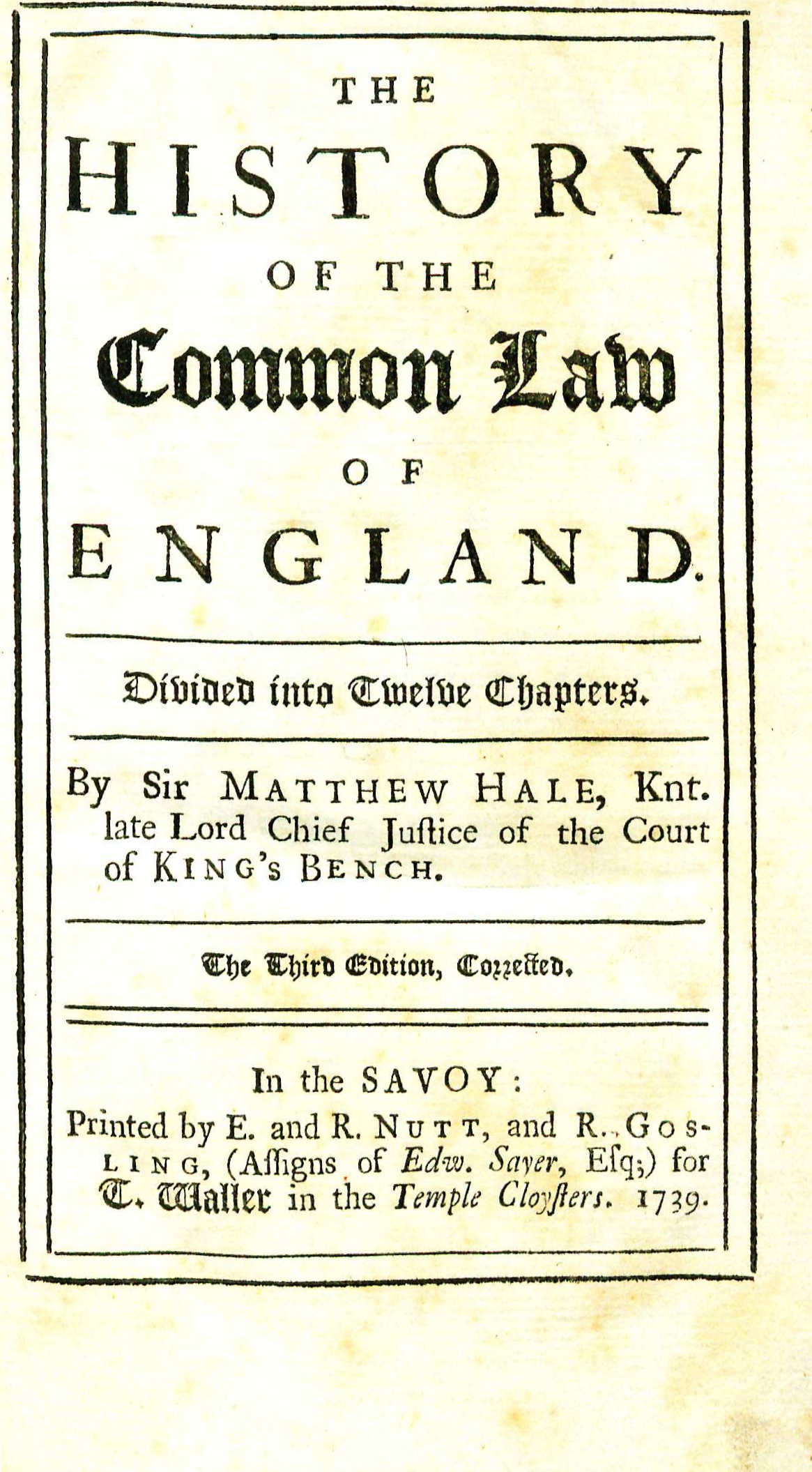Difference between revisions of "History of the Common Law of England"
(fn) |
(→Description of the Wolf Law Library's copy) |
||
| Line 25: | Line 25: | ||
Re-bound in period-design marbleized paper over boards, beautifully re-backed in leather with leather tips and spine label. Title page includes a faint signature from a previous owner. Purchased from Museum Books, LLC.<br /> | Re-bound in period-design marbleized paper over boards, beautifully re-backed in leather with leather tips and spine label. Title page includes a faint signature from a previous owner. Purchased from Museum Books, LLC.<br /> | ||
<br /> | <br /> | ||
| − | View this book in [https://catalog.swem.wm.edu/law/Record/3679298 William & Mary's online catalog.] | + | View the record for this book in [https://catalog.swem.wm.edu/law/Record/3679298 William & Mary's online catalog.] |
==References== | ==References== | ||
Revision as of 15:16, 10 March 2015
The History of the Common Law of England Divided into Twelve Chapters
by Matthew Hale
| The History of the Common Law of England | |
|
Title page from The History of the Common Law of England, George Wythe Collection, Wolf Law Library, College of William & Mary. | |
| Author | Matthew Hale |
| Published | London, In the Savoy: printed by E. and R. Nutt, and R. Gosling, (assigns of Edw. Sayer, Esq); for T. Waller |
| Date | 1739 |
| Edition | Third, corrected |
| Language | English |
| Pages | [8], 261, [11] |
| Desc. | 8vo. |
Sir Matthew Hale (1609- 1676) attended Lincoln’s Inn to study the law in the footsteps of his father, who died when Hale was very young.[1] While studying at Lincoln’s Inn, Hale became very close with the attorney general, William Noy (d. 1634).[2] Noy is believed to have helped shape Hale’s love for medieval transcripts.[3] Hale entered the bar in 1636 after the normal seven years of schooling.[4] In 1671, Sir Matthew Hale became the chief justice of the Court of King’s Bench, a well-deserved role considering the amount of writing he was doing on criminal law and the common law.[5]
The History of the Common Law of England was not published until a decade after Hale’s death, but it is thought to have been "quite widely circulated."[6] The book was the first attempt to compile a comprehensive look at English common law, and was a standard text until the late nineteenth century.[7] The History of the Common Law is considered slightly biased because it only included what Hale thought was formative—an emphasis on the twelfth and thirteenth centuries and nothing from the Tudor-Stuart era.[8]
Evidence for Inclusion in Wythe's Library
Goodwin's pamphlet,[9] Dean's Memo[10], and Brown's Bibliography[11] all include History of the Common Law of England. Dean and Goodwin relied upon on a reference in William Edwin Hemphill's dissertation on Wythe, "George Wythe the Colonial Briton." In discussing Thomas Jefferson's commonplace book, Hemphill states "The succeeding section of the book, written between 1774 and 1777, was based ... upon more philosophical materials, including ... Hale's History of the Common Law."[12] Brown cites Hemphill, but also refers to Jefferson's commonplace book itself.[13] Jefferson studied law under Wythe from 1762 to 1767, so the entries from the mid 1770s may not reflect Wythe's influence. Despite this, Dean lists the 1716 edition as mentioned by Hemphill. Goodwin and Brown note the 1739 edition which Jefferson sold to the Library of Congress.[14] The Wolf Law Library followed the recommendations of Brown and Goodwin and purchased the 1739 edition.
Description of the Wolf Law Library's copy
Re-bound in period-design marbleized paper over boards, beautifully re-backed in leather with leather tips and spine label. Title page includes a faint signature from a previous owner. Purchased from Museum Books, LLC.
View the record for this book in William & Mary's online catalog.
References
- ↑ A. Cromartie, "Hale, Sir Mathew (b.c 1609 d. in 1676)" in Oxford Dictionary of National Biography, accessed October 9, 2013.
- ↑ H. Flander, “Sir Matthew Hale,” University of Pennsylvania Law Review and American Law Register 56 (1908), 6.
- ↑ Ibid.
- ↑ Cromartie, “Hale, Sir Mathew."
- ↑ Ibid.
- ↑ Ibid.
- ↑ Harold J. Berman, "The Origins of Historical Jurisprudence: Coke, Selden, Hale," Yale Law Journal 103 (1994), 7.
- ↑ Ibid.
- ↑ Mary R. M. Goodwin, The George Wythe House: Its Furniture and Furnishings (Williamsburg, Virginia: Colonial Williamsburg Foundation Library, 1958), XLVIII.
- ↑ Memorandum from Barbara C. Dean, Colonial Williamsburg Found., to Mrs. Stiverson, Colonial Williamsburg Found. (June 16, 1975), 11 (on file at Wolf Law Library, College of William & Mary).
- ↑ Bennie Brown, "The Library of George Wythe of Williamsburg and Richmond," (unpublished manuscript, May, 2012) Microsoft Word file. Earlier edition available at: https://digitalarchive.wm.edu/handle/10288/13433.
- ↑ William Edwin Hemphill, "George Wythe the Colonial Briton: A Biographical Study of the Pre-Revolutionary Era in Virginia" (PhD diss., University of Virginia, 1937), 127.
- ↑ Gilbert Chinard, ed., The Commonplace Book of Thomas Jefferson: A Repertory of His Ideas on Government (Baltimore, MD: The Johns Hopkins Press, 1926), 162.
- ↑ E. Millicent Sowerby, Catalogue of the Library of Thomas Jefferson, 2nd ed. (Charlottesville: University Press of Virginia, 1983), 2:226 [no.1799].
External Links
Read this book in Google Books.
